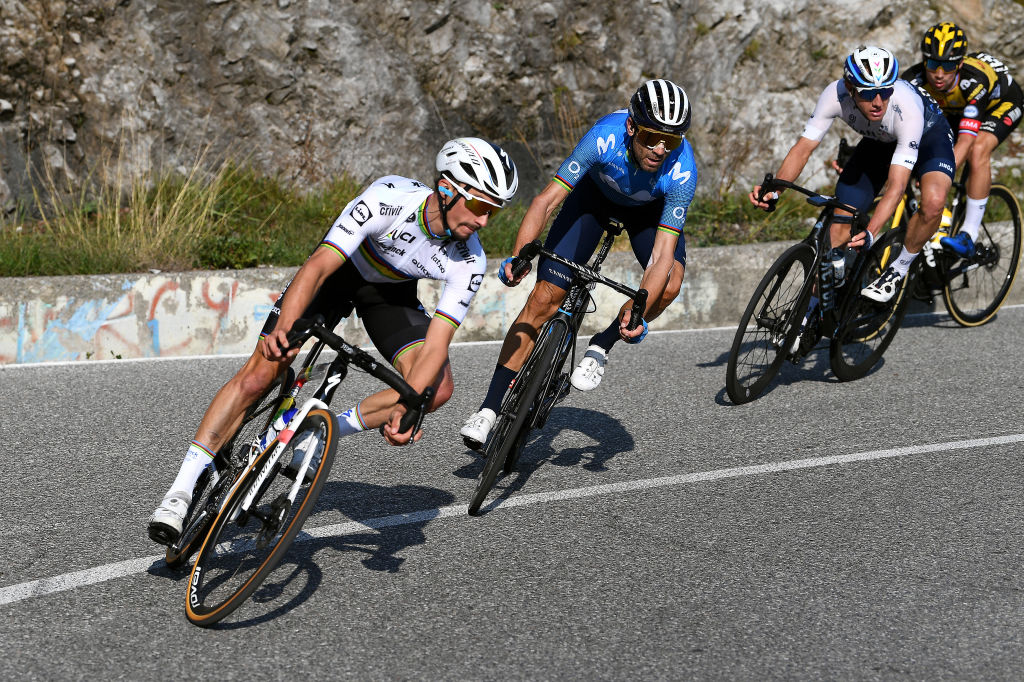Alaphilippe: We decided to play Masnada's card and second place at Il Lombardia isn't bad
Bramati downplays the idea that the Italian upset team's hierarchy

Right place, wrong man? Local knowledge helped Fausto Masnada navigate the descent of the Selvino better than anyone else at Il Lombardia, but after he bridged across to lone leader Tadej Pogacar (UAE Team Emirates), he could already sense that he was racing for second place in his native Bergamo.
With his Deceuninck-QuickStep teammate Julian Alaphilippe in the select chasing group behind, Masnada had licence to sit on Pogačar's wheel on the run-in, sparing himself for one game attempt to catch the Slovenian by surprise with an acceleration atop the short final ascent in Bergamo Alta. Pogačar was wise to Masnada's effort, however, and the Tour de France champion's victory in the two-up sprint was all but an inevitability.
"The only way to try to drop him was at that point. I didn't pull on the flat because Julian was behind, but Tadej was stronger. There was nothing to be done. I knew I was beaten in the sprint," Masnada said in the mixed zone afterwards. "I didn't pull on the flat and he was still quicker, which showed he was the strongest today."
Pogačar surged clear alone on the Passo di Ganda with 36km remaining, quickly opening a lead of half a minute over a dwindling group of chasers. With João Almeida and Remco Evenepoel already distanced, Masnada was the only teammate Alaphilippe had for company on the final ascent. Both men made unsuccessful attempts to cut the deficit to Pogačar on the way up the climb, but the Slovenian's raw strength brooked no argument.
Masnada, however, knew every twist and turn in the road on the over the other side, which dropped down the Selvino, a descent imprinted in the subconscious of every cyclist in the province of Bergamo. He navigated the 19 hairpins as though he were on rails, bridging across to Pogačar with a shade under 16km remaining.
Deceuninck-QuickStep's strength in numbers so often helps the team outmanoeuvre the opposition in the Flemish Classics, but it didn't have quite the same effect on a rosy-hued afternoon in Lombardy. Masnada was in front with a quicker – and stronger – man, while the world champion Alaphilippe was marooned 45 seconds behind in a group where he was now unable to work and where nobody was minded to tow him across.
Alaphilippe would eventually finish in sixth place, 51 seconds down on Pogačar and Masnada, having made one forlorn effort to bridge across alone when the race had already long since escaped his grasp.
Get The Leadout Newsletter
The latest race content, interviews, features, reviews and expert buying guides, direct to your inbox!
"Fausto found himself in front but he had already done a lot of work before so we didn't know what he could give. In the end, it was decided to play his card, and second behind Pogacar isn't bad," said Alaphilippe, who acknowledged that he had lacked the conviction to try to jump across to Pogačar on the Passo di Ganda.
"Maybe I was lacking a bit of confidence to make the jump because my legs were going well," Alaphilippe said. "Ok, I was on the limit like everyone in the group, and because the last few days were a bit complicated, I wasn't sure if could follow. Fausto did it in my place and unfortunately, he didn't win, but second in a Monument is still good."
Alaphilippe knows what it is to lose a sprint to Pogačar at the end of a Monument, of course, having been upset by the Slovenian in the finishing straight at Liège-Bastogne-Liège in April. On the finish line, the Frenchman dismissed the idea that he had regrets about Deceuninck-QuickStep's strategy – "No, I'm happy," he said – even if some of his grimaces in the finale suggested a certain exasperation at how his afternoon had played out.
"On the descent, we heard on race radio that Masnada was halfway up the road [to Pogačar], so I told him to close the gap and then sit on," directeur sportif Davide Bramati told RAI afterwards. "I thought that there would be more collaboration in Julian's group, but even if Masnada had stayed behind with him, I don't think we would have been able to close the gap."
Masnada, for his part, downplayed the idea that he had upset the team hierarchy by bridging across to Pogačar on the descent he knew so well, carefully reiterating that he was mindful of his place in the firmament amid the constellation of stars at Deceuninck-QuickStep.
"Honestly, at the top of the climb [Passo di Ganda], there were accelerations. Julian tried first, and then I went," Masnada said. "In the end, I got a gap on the descent of the Selvino and I got across to Tadej. But I never collaborated, and Julian was happy with that. He was happy with my second place at the finish. I think the team is happy with how the race went.
"In the end, I ride for the strongest team in the world and everybody on the team has his role. Then in a race like today, it was a route well suited to me and I played my card. The team gave me my chance today and I took advantage of it. But I know well what my role in the team is, and I'll continue to do that while growing in the best way possible at the same time."

Barry Ryan was Head of Features at Cyclingnews. He has covered professional cycling since 2010, reporting from the Tour de France, Giro d’Italia and events from Argentina to Japan. His writing has appeared in The Independent, Procycling and Cycling Plus. He is the author of The Ascent: Sean Kelly, Stephen Roche and the Rise of Irish Cycling’s Golden Generation, published by Gill Books.